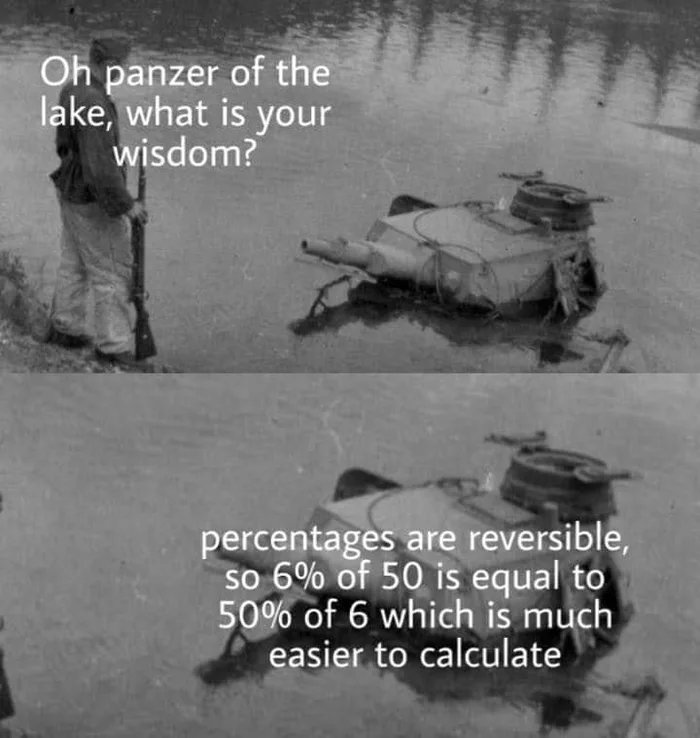this post was submitted on 09 Nov 2023
1381 points (98.2% liked)
Memes
45629 readers
1134 users here now
Rules:
- Be civil and nice.
- Try not to excessively repost, as a rule of thumb, wait at least 2 months to do it if you have to.
founded 5 years ago
MODERATORS
you are viewing a single comment's thread
view the rest of the comments
view the rest of the comments

They probably did, just not explicitly:
You could write (6*1/100)*50 = 6*(50*1/100)
It only uses the commutative property of multiplication and the fact that % is another way of writing 1/100.
Maybe also worth remembering that "x% of y" is just x/100*y
I'm confused again.
The word percent is exactly that per cent, which basically means parts of hundred. E.g. 10% are 10 of 100, or 60% are 60 of 100. You can also write this mathematically as 60/100 or 60÷100, which is 0.6.
Now in general: x% are x parts of 100 or x/100 or x÷100. If you want to calculate x% of y you just multiply it: y × x% = y × x ÷ 100.
This is one of those "maths is magical" moments, I guess.
Mathemagics.
I'm sorry but you have the big dumb
By what part?
I totally remember being taught this. It's just way easier to break down percentages in terms of the nearest 1% or 10% times the number in the percent times the number you're taking the percentage of. You don't have to do the math for the 1 or 10 percentage as long as you remember that a 10% means move the decimal left once and 1% means move the decimal left twice. The rest is just basic multiplication.
40% of 59 = 10% of 59 times 4.
So...
4x59=236
or
(4x50=200) + (4x9=36)= 236
10% means move the decimal left once,
Therefore 40% of 59 is 23.6
With that you can easily do more complex percentages mentally like...
62% of 35 = 10% of 35 times 6 plus 1% of 35 times 2.
35x6=180+30=210 at 10% so 21
plus
35x2=60+10=70 at 1% so 0.7
Therefore 62% of 35 = 21.7
While I get your sentiment, I'm always baffled how people fail to just memorize some basic formulas/equations and then just to plug and play:
1÷kⁿ = k⁻ⁿ
% = 1÷100 = 10⁻²
k×10ⁿ equals k with its floating point shifted by n to the right for positive n, or to the left for negative n
That's really all one needs to know for the "problem" at hand. For your concrete example of "40% of 59" that would just be
59×40×10⁻²
Just solve that whatever way is easiest. I don't get why people get panic-stricken when they see the % sign.